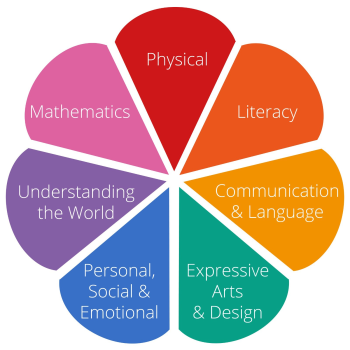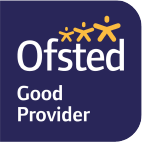Your Childs Learning Journey At Nursery
At Leafield House we follow and consult the EYFS standards as set out by the government. Our team at Leafield House observe and assess the children throughout the day. Throughout the nursery the practitioners and key workers use their knowledge and expertise to engage each child in fun, stimulating and educational activities. The Childs key person will get to know each individuals interests which will allow them to develop and plan specific activities for the week, to further their learning through play. The activities will often be tailored to fit in with the current topic for the room.
Every child has their own online profile via iConnect which you can view on the parent app. This is the tool we use to assess each child, enabling the key workers to publish weekly, small observations with next steps to follow. We also publish daily snapshots, updates on meals/sleep/nappies, two year old checks, termly assessments, and further long observations on any areas of concern. This information is shared with parents instantly through the app, not only allowing you to see some of your child’s day at nursery but also read through your child’s assessment. Parents are also invited to contribute to their child’s learning journey from home. Within the app there is a tool for you to communicate and share what they have been doing at home, this helps to contribute to a joint learning profile, as well as developing a positive parent-nursery relationship. We will hold a termly parent consultation meeting to discuss your child’s development and enable you to contribute to their development and set targets. These can be held in person or by video call, we know family time is important so aim to be as flexible as possible!
On both pick up and drop-offs, staff in the rooms and management staff are readily available to talk through the day or anything else you may wish to discuss with us.
EYFS: Statutory Framework For Early Years Foundation Stage
As stated in the EYFS statutory framework September 2023:
All children deserve the best possible start in life and the support that can enable them to fulfill their full potential. Children develop quickly in the early years and a child’s experiences between birth and age five have a major impact on their future life chances. A secure, safe and happy childhood is important in its own right. Good parenting and high quality early learning together provide the foundation children need to make the most of their abilities and talents as they grow up.
The Early Years Foundation Stage (EYFS) sets the standards that all early years providers must meet to ensure that children learn and develop well and are kept healthy and safe. It promotes teaching and learning to ensure children’s ‘school readiness’ and gives children the broad range of knowledge and skills that provide the right foundation for good future progress through school and life.
The EYFS seeks to provide:
• quality and consistency in all early years settings, so that every child makes good progress and no child gets left behind
• a secure foundation through planning for the learning and development of each individual child, and assessing and reviewing what they have learned regularly.
• partnership working between practitioners and with parents and/or carers
•equality of opportunity and anti-discriminatory practice, ensuring that every child is included and supported.
The Four Key Principles:
The four key principles are set out by the EYFS to help shape the practise in early years settings.
• every child is a unique child, who is constantly learning and can be resilient, capable, confident and self-assured
• children learn to be strong and independent through positive relationships
• children learn and develop well in enabling environments with teaching and support from adults, who respond to their individual interests and needs and help them to build their learning over time. Children benefit from a strong partnership between practitioners and parents
and/or carers.
• importance of learning and development. Children develop and learn at different rates. The framework covers the education and care of all children in early years provision, including children with special educational needs and disabilities (SEND).
Three Characteristics Of Effective Teaching And Learning:
• Playing and exploring – children investigate and experience things, and ‘have a go’
• Active learning – children concentrate and keep on trying if they encounter difficulties, and enjoy achievements
• Creating and thinking critically – children have and develop their own ideas, make links between ideas, and develop strategies for doing things.
The Seven Areas of Learning:
There are seven areas of learning and development that shape the way early years settings help children to learn and develop. All areas of learning and development are important and inter-connected.
Three areas are particularly important for building a foundation for igniting children’s curiosity and enthusiasm for learning, forming relationships and thriving. These are known as the prime areas.
There are four specific areas: through which the three prime areas are strengthened and applied in daily practise.
Prime Areas:
• communication and language
• physical development
• personal, social and emotional development
Specific Areas:
• literacy
• mathematics
• understanding the world
• expressive arts and design

Progress Check :Age 2
As stated in the EYFS statutory framework September 2023:
When a child is aged between two and three, practitioners must review their progress, and provide parents and/or carers with a short written summary of their child’s development in the prime areas. This progress check must identify the child’s strengths, and any areas where the child’s progress is less than expected. If there are significant emerging concerns, or an identified special educational need or disability, practitioners should develop a targeted plan to support the child’s future learning and development involving parents and/or carers and other professionals (for example, the provider’s Special Educational Needs Co-ordinator (SENCO) or health
professionals) as appropriate.
Beyond the prime areas, it is for practitioners to decide what the written summary should include, reflecting the development level and needs of the individual child. The summary must highlight: areas in which a child is progressing well; areas in which some additional support
might be needed; and focus particularly on any areas where there is a concern that a child may have a developmental delay (which may indicate a special educational need or disability). It must describe the activities and strategies the provider intends to adopt to address any issues or concerns. If a child moves settings between the ages of two and three it is expected that the progress check would usually be undertaken by the setting where the child has spent most time. Practitioners must discuss with parents and/or carers how the summary of development can be used to support learning at home.
Practitioners should encourage parents and/or carers to share information from the progress check with other relevant professionals, including their health visitor and the staff of any new provision the child may transfer to. Practitioners must agree with parents and/or carers when will be the most useful point to provide a summary. Where possible, the progress check and the Healthy Child Programme health and development review at age two (when health visitors gather information on a child’s health and development) should inform each other and support integrated working. This will allow health and education professionals to identify strengths as well as any developmental delay and any particular support from which they think the child/family might benefit. Providers must have the consent of parents and/or carers to share
information directly with other relevant professionals.


